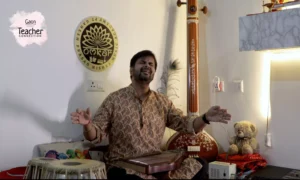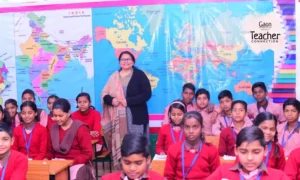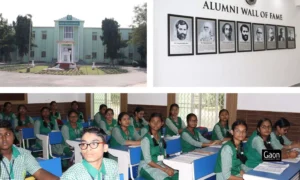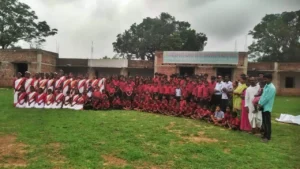Sheikhpora (Baramulla), Jammu & Kashmir
At a time when government-run schools are seeing enrolments dropping as parents prefer to send their children to private schools, the Government Primary School in Sheikhpora village in Kreeri tehsil, situated some 55 kilometres from the capital Srinagar, has a different story to tell.
Irfan Ahmed Shah, a 33-year-old teacher at this school, has a large part to play in this change. From Sheikhpora village in North Kashmir’s Baramulla district, Shah is leveraging social media and technology to attract more enrolments to the school. He has created an official website for the school that also has a YouTube channel of its own.

The project based learning methods, use of art in teaching and experiential learning methods used in this school are helping students develop better.
According to Shah, the school was one of the pilot schools in the Kashmir valley where the learning management system (LMS) was introduced during COVID-19. Learning Management System, is an online integrated software used for creating, delivering, tracking, and reporting educational courses and outcomes. It can be used to support traditional face-to-face instruction, as well as blended/ hybrid and distance learning environments. This unique learning initiative was introduced in the school by the Directorate of School Education in Kashmir.
“We have online access available for all official school-related information, including grades, attendance, exam results, student bios, etc. It is a simple and transparent method to keep track of things. Results, attendance, and any other pertinent data is available to students as well as their parents,” Shah explained.
Also Read: Gaon Connection launches its monthly e-magazine, Teacher Connection
The teacher said the school had already taken steps before the pandemic to educate the parents on how they could now monitor the academic progress of their children.
“It became simple for us to conduct online classes during the COVID-19 lockdown because the parents had already received training about online classes, results, and other topics through WhatsApp/ YouTube or even in person, way back in 2017. As a result, the children had no trouble attending lectures and completing and submitting assignments online,” he said.

The school was one of the pilot schools in the Kashmir valley where the learning management system (LMS) was introduced during COVID-19.
Bashir Dar, a parent of a standard one student living in Sheikhpora village, said the online updates helped them keep track of their wards.
“We receive frequent online updates regarding their academic progress, test results, schedules, and admissions information. The system is safe, secure, and simple to use. Also, it allows us to keep track of everything from one location,” Dar, told Gaon Connection.
“The District Institute of Education and Training in Baramulla recognised this school as the best institution during the COVID-19 pandemic,” a proud Shah told Gaon Connection. According to him, the right use of technology could go a long way in improving standards of education and more government schools should do so.
Also Read: Conversations with a cab driver led to setting up of a school in Turtuk village, Ladakh
A humble beginning
This primary school was started in 2010 and operated for the first four years under another school. It was only in 2016 that the school began operating autonomously, and like so many government-run schools, it too did not have many enrollments.

Irfan Ahmed Shah, a 33-year-old teacher at this school, has a large part to play in transforming his school into a model school.
“I started teaching at this school in 2016, and back then only 24 students were enrolled. Later in 2020, admissions rose to 114, and this year, it is 122,” Shah said.
It was in 2018 that the Government Primary School in Sheikhpora launched its website, which was inaugurated by the Zonal Education Officer (ZEO) during the school’s annual day celebrations. At this event, the school was hailed as the ‘Model Primary School’ of the Wagoora Block, in Baramulla, and to this day, it is the only ‘Model’ school there.

The teacher hopes that the administration will provide more support in tackling the school’s infrastructure.
A model school is supposed to be one where there are innovative learning and teaching practices. The education imparted in these schools should be holistic, with emphasis on academics, physical well being and emotional wellbeing. Model schools are selected on the basis of their performance and they are usually extended more support from the government.
“In 2018, a team from the Ministry of Human Resource Development, New Delhi, visited the school and felicitated the teachers and students for their contributions to elevating its cultural and academic standards. The national team also provided us with furniture and assistance in construction work,” Shah said.
According to him, in the financial year 2022-2023, an annual school grant of Rs 25,000 was provided by the central government Samagra Shiksha, but the school spent nearly Rs 60,000. “We tiled the hallway and maintained the kitchen area where the mid day meals for children are prepared. The five staff members [including Shah] contributed towards the additional costs out of their own pockets,” Shah said.
Also Read: Following His Father’s Footsteps, a Retd Govt Official Sets Up A School For Orphans And Poor Kids
Many parents have taken their children out of private schools to have them attend this school. Ajaz Deen from Sheikhpora, is thrilled about his decision to do so.

Irfan Ahmed Shah addresses himself as a regular teacher trying his best to mould the future of these youngsters for a brighter tomorrow.
“The project based learning methods, use of art in teaching and experiential learning methods used in this school are helping students develop better, intellectually and emotionally, and that is great for their future. I am indebted to this school which motivated my three children into becoming toppers in the zone,” Deen told Gaon Connection.
Students from the school have competed in numerous district-level competitions and have performed well in them. The school has also been appreciated for taking part in the “Back to the Village” initiative run by the Jammu and Kashmir Government.
The aim of the programme is to bridge the gap between the achievable and achieved goals in development, take governance to doorsteps of the rural and inaccessible areas, and generate credible and empirical feedback. The programme aims to involve the people of the state and government officials in a joint effort to deliver the mission of equitable development. The goal is to bring development to rural areas through community participation.
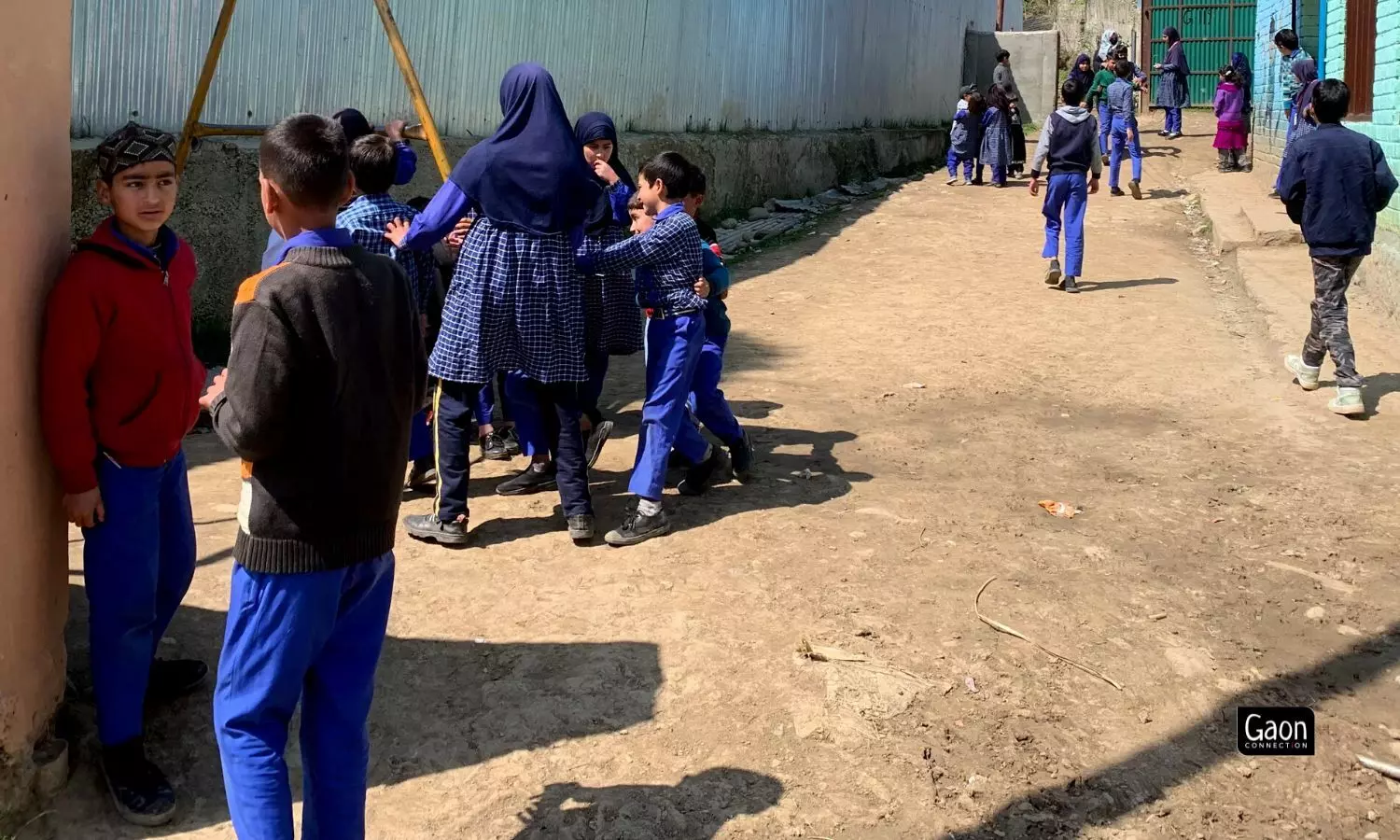
Students from the school have competed in numerous district-level competitions and have performed well in them.
Shah hopes that the administration will provide more support in tackling the school’s infrastructure. “We need more classrooms and better playing areas for the children,” he said. There are two classrooms presently in the schools where four classes are held. The school is hoping to get at least four more classrooms. The morning assembly is held out on the lanes.
“We are not taking any further admissions due to lack of adequate infrastructure. If that was taken care of, the enrollment would rise further,” Shah said.
However, Shah is not discouraged at all. “My co-workers and all the parents have been very supportive, which inspires me. I am simply a regular teacher trying my best to mould the future of these youngsters for a brighter tomorrow,” he said.







